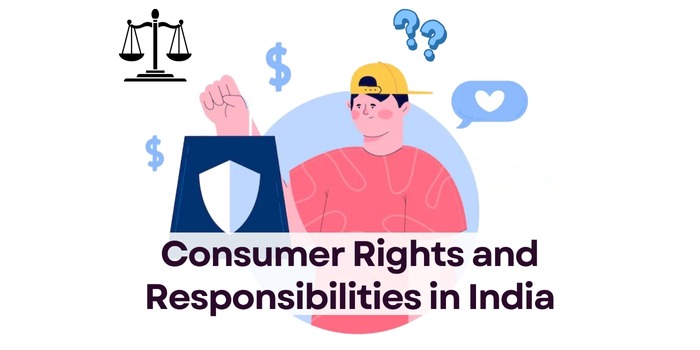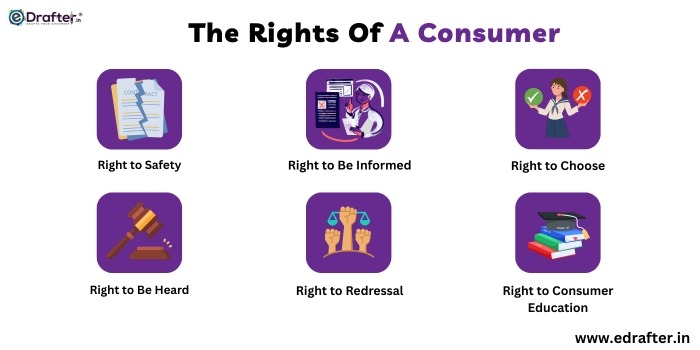
Table of Contents
In India, consumers form the backbone of the economy. However, this central role comes with both entitlements and duties. Understanding consumer rights and responsibilities is not just beneficial but essential for every Indian citizen. While the law provides a strong shield to protect buyers, it also expects them to act responsibly. This blog offers a comprehensive introduction to consumer rights, explores consumer responsibilities, and outlines how you can safeguard your interests as a consumer.
What Is Consumer Right?
A consumer right is a legally recognized claim that empowers buyers to receive fair treatment, accurate information, a correct product, and protection from exploitation in the marketplace. These rights ensure that every consumer can make informed decisions and seek redress when necessary. The Consumer Protection Act, 2019, in India codifies these rights, aiming to strike a balance between businesses and consumers.
What Are Consumer Responsibilities?
While it’s important to know your rights, understanding your consumer responsibilities is equally important. A responsible consumer contributes to a fair, safe, and sustainable marketplace by being alert, informed, and ethical in their consumption choices. The balance between rights and responsibilities ensures mutual respect and accountability between buyers and sellers.
What Are The Rights Of A Consumer?
Here’s a detailed breakdown of the consumer rights in India:

1. Right to Safety: Consumers have the right to be protected against goods and services that are hazardous to life and property.
2. Right to Be Informed: Consumers must be provided with all necessary details such as price, quality, quantity, ingredients, and expiry dates, to make informed choices.
3. Right to Choose: The right to choose consumer rights ensures that consumers have access to a variety of products and services at competitive prices. It protects them against monopolistic practices.
4. Right to Be Heard: Consumers have the right to voice their concerns and complaints in appropriate forums and expect a fair hearing.
5. Right to Redressal: Consumers can seek redressal against unfair trade practices, defective goods, and unsatisfactory services.
6. Right to Consumer Education: The right to know about one’s rights and responsibilities as a consumer is critical to making empowered decisions in the market.
Also Read – How To Track Consumer Complaints?
What Are The Responsibilities Of A Consumer?
In a consumer-driven economy like India, the marketplace thrives on trust, transparency, and fairness. However, this ecosystem functions effectively only when consumers are not just aware of their rights but also committed to their responsibilities. Consumer responsibilities are the duties every buyer should uphold to ensure a just and sustainable market environment. Let’s explore each in detail:
1. Be Aware: A consumer should have a clear understanding of their consumer rights and responsibilities, including the right to safety, information, choice, redressal, and more. This awareness also includes having adequate knowledge about the products and services one purchases. Consumers must actively seek information related to product specifications, pricing, terms and conditions, safety precautions, and after-sales service before making any purchase decision.
2. Check for Quality Certifications: One of the key responsibilities of a consumer is to ensure the quality and safety of the goods or services they purchase. This involves checking for official certifications that guarantee product standards. Marks like ISI (for industrial and electrical products), AGMARK (for agricultural goods), and FSSAI (for food items) are indicators that the product complies with national safety and quality regulations. Purchasing certified products minimises risks and promotes accountability among manufacturers and sellers.
3. Ask for Bills and Receipts: A responsible consumer always insists on a proper bill or receipt at the time of purchase. This document serves as legal proof of the transaction and is essential if the consumer needs to return the product, claim warranty benefits, or seek redressal for defective goods or unsatisfactory services. Not demanding a bill encourages informal and unregulated trade practices that can undermine consumer rights.
4. Read Labels Carefully: Consumers are expected to thoroughly read and understand product labels before purchasing. Labels contain crucial information such as ingredients, manufacturing and expiry dates, usage instructions, and safety warnings. Reading labels not only ensures that the product is suitable and safe for use but also helps consumers avoid allergens, expired items, or misleading claims
5. Avoid Wasteful Consumption: Consumers must avoid buying in excess, hoarding goods, or wasting resources. Responsible consumption practices include choosing eco-friendly products, minimising the use of plastic, conserving energy, and preferring durable over disposable items. This not only protects the environment but also ensures fair distribution of resources among all sections of society.
6. Report Unethical Practices: When consumers come across unfair trade practices, deceptive advertisements, substandard products, or service deficiencies, they must report them to the appropriate authorities or consumer forums. By raising complaints and demanding accountability, consumers contribute to a healthier marketplace.
What Steps Has The Government Taken To Protect Consumer Rights?
The Indian government has made significant efforts to protect consumer rights:
- Consumer Protection Act, 2019: Strengthens the framework for redressal and introduces concepts like product liability and e-commerce regulation.
- Consumer Dispute Redressal Commissions (CDRCs): Set up at the district, state, and national levels to resolve disputes quickly.
- Online Grievance Portals: Platforms like https://consumerhelpline.gov.in enable easy online complaint registration.
- Mandatory Product Labeling and Advertising Standards to prevent misleading information.
- Jago Grahak Jago Campaign: A nationwide awareness campaign to educate people about their rights.
What Steps Does A Consumer Take To Protect His Rights?
To actively protect their rights, consumers must:
- Register complaints with sellers, manufacturers, or service providers.
- File complaints in different types of consumer complait like District, State, or National CDRCs if unresolved.
- Use the National Consumer Helpline or mobile apps for quick grievance redressal.
- Participate in consumer forums and awareness programs.
How Edrafter Helps You Protect Your Consumer Rights?
eDrafter simplifies the legal process by offering reliable documentation and guidance services for consumers. From legal consultation to drafting legal notices and helping you file consumer complaints, and guiding you through the consumer court process, eDrafter ensures your consumer rights are enforced effectively and affordably.
With expert support and digital solutions, eDrafter becomes your legal companion in holding sellers and service providers accountable.
Conclusion
Awareness of the consumer rights and responsibilities is crucial. While laws provide strong protection, real change begins with informed, ethical, and vigilant consumers. Know your right to choose consumer rights, raise your voice against unfair practices, and uphold your consumer responsibilities. When in doubt or distress, legal platforms like eDrafter can assist you in navigating the path to justice. Together, informed citizens and proactive governance can create a fair and transparent market for all.

